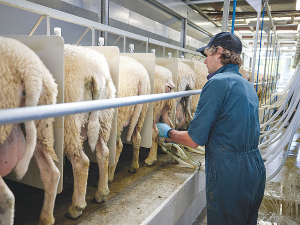Damien O’Connor: NZ united on global trade
When it comes to international trade, politicians from all sides of the aisle are united, says Labour's trade spokesman Damien O'Connor.
 The Government is providing $700,000 to fund a project to support Māori landowners to invest in New Zealand's sheep milk industry.
The Government is providing $700,000 to fund a project to support Māori landowners to invest in New Zealand's sheep milk industry.
The Government is providing $700,000 to fund a project to support Māori landowners to invest in New Zealand’s growing sheep milk industry, says Agriculture Minister Damien O’Connor.
“We are backing the Māori Agribusiness Sheep Milk Collective, which has ambitious goals to have multiple farms milking about 25,000 sheep and potentially employing more than 100 people by 2030,” O’Connor says.
He says global demand for sheep milk and sheep milk products is booming, with exports of New Zealand sheep milk products were valued at $20 million in 2020.
“We are injecting $700,000 into the Māori Agribusiness Sheep Milk Collective to help them explore the potential of their whenua to sustainably produce sheep milk at scale, create jobs and further grow this emerging export market.
“The collective is made up of 20 Māori land trusts and incorporations that own more than 24,000 hectares of land stretching from the western shore of Lake Taupō to the Hauraki Plains.
“Those sheep could initially produce more than six million litres of milk, or one million kilograms of milksolids, and within a kaupapa Māori-owned value chain.”
The collective was set up through the Ministry for Primary Industries’ Māori Agribusiness Extension (MABx) programme, which has been allocated $12 million over four years to provide farmer-to-farmer support to Māori landowners and trustees.
“The investment is part of the Government’s Fit for a Better World roadmap, which aims for food and fibre sector exports to earn an extra $44 billion over 10 years,” O’Connor says.
“MPI’s Māori Agribusiness team has partnered with 26 Māori agribusiness clusters across the motu since 2019, helping Māori landowners access support and expertise.”
“MPI is funding a $12.56 million six-year project with the aim of building a high-value and sustainable sheep dairy industry in Aotearoa New Zealand,” Damien O’Connor said.
“Last year construction and development was taking place across several new sheep dairy farms in the greater Waikato and a new infant formula was launched as part of the project.
“We are focussed on our economic recovery from COVID-19. By strengthening the environmental credentials of our food and fibre products and capturing further value growth, Fit for a Better World drives us along that recovery,” says O’Connor.
The World Wide Sires National All Day Breeds Best Youth Camp Best All Rounder plaudit has become family affair, with 2026 Paramount Cup winner Holly Williams following in her sister Zara's footsteps.
DairyNZ is giving New Zealand farmers a unique opportunity to gain hands-on governance and leadership experience within the dairy sector.
Herd improvement company LIC has posted a 5.2% lift in half-year revenue, thanks to increasing demand for genetics.
According to the latest Fresh Produce Trend Report from United Fresh, 2026 will be a year where fruit and vegetables are shaped by cost pressures, rapid digital adoption, and a renewed focus on wellbeing at home.
The Roar is a highlight of the game hunting calendar in New Zealand, with thousands of hunters set to head for the hills to hunt male stags during March and April.
OPINION: The past few weeks have been tough on farms across the North Island: floods and storms have caused damage and disruption to families and businesses.